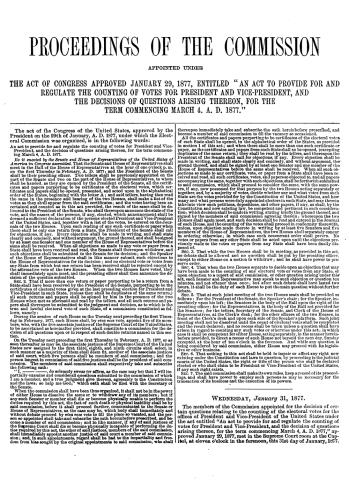
Description
Soon after election day, it was clear the Democratic candidate, Samuel J. Tilden, had secured 184 of the 185 electoral votes needed to win the presidency. Nineteen electoral votes from Florida, Louisiana and South Carolina remained disputed because rival Democratic and Republican state election boards claimed victory in each of the three states. Tilden needed only one electoral vote to win, whereas Rutherford B. Hayes, the Republican nominee, needed all nineteen. After weeks of waiting for a solution, Congress created an electoral commission on January 29, 1877, to settle the dispute. The commission was made up of 15 members with five each coming from the House of Representatives, Senate and Supreme Court. After weeks of deliberation, on March 1, only three days before inauguration day, the commission voted 8-7 along party lines to award all 19 disputed electoral votes to the Republican Hayes. With the decision, he secured the required 185 votes to win the presidency.
Source-Dependent Questions
- During the closely contested election of 1876, three states both Rutherford B. Hayes and Samuel J. Tilden needed to win the presidency (Florida, Louisiana and South Carolina) submitted conflicting electoral vote counts from rival state Republican and Democratic election boards. How did Congress plan to handle this situation?
- How many members would belong to this electoral commission and where would they be appointed from?
- How would the objections of members of the House of Representatives and the Senate make their way to the electoral commission?
- What steps needed to be taken by Congress to override the decision of the electoral commission if it disagreed with the group's decision?
- After a disputed election, how might the nation respond to a presidency ultimately decided by such a small group of politicians?
Citation Information
"An Act To Provide For And Regulate The Counting Of Votes For President And Vice-President, And The Decisions Of Questions Arising Thereon, For The Term Commencing March 4 A.D. 1877," U.S. Congress, 29 January 1877. Courtesy of Library of Congress